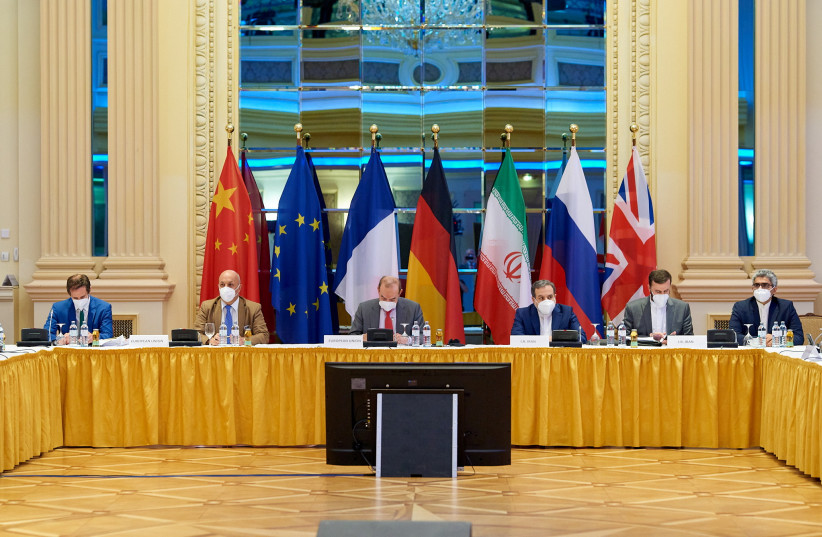United States President Joe Biden spoke with three signatories to the Iran nuclear deal on Sunday about the importance of constraining Tehran’s “destabilizing regional activities” as Israel moved to try to thwart the revival of the 2015 agreement.
British Prime Minister Boris Johnson, French President Emmanuel Macron, German Chancellor Olaf Scholz and Biden held a wide-ranging conversation about global issues including Iran. Russia and China, which also signed onto the Joint Comprehensive Plan of Action, known as the Iran deal, were not part of the conversation.
The four men “discussed ongoing negotiations over Iran’s nuclear program” and “the need to strengthen support for partners in the Middle East region.”
The conversation came as attempts to revive the 2015 deal hit a critical phase. The US and the European Union said last week that they were studying Iran’s response to what the EU has called its “final” proposal to revive the deal, under which Tehran curbed its nuclear program in return for economic sanctions relief.
Israel had opposed the original deal and Biden’s efforts to revive it. It fears the US will make last-minute concessions that will make what it considers to be a bad agreement even worse.

National Security Advisor Eyal Hulata heads to the US this week in an attempt to sway the US to change its mind. Last week, Prime Minister Yair Lapid spoke with Scholz and with US Ambassador to Israel Tom Nides. Lapid is also expected to visit Scholz in Germany in the coming weeks, according to KAN.
How does the IRGC fit in?
Over the weekend, CNN said Iran was willing to give up on its demand that the US remove the Iranian Revolutionary Guard from the State Department’s Foreign Terrorist Organizations list.
Pundits speculated that the sudden flexibility on Iran’s part meant that it wanted to arrive at a deal.
At a speech on Sunday in Tehran, however, Iran President Ebrahim Raisi struck a hardline tone when he said, “We will not back down on the nation’s rights at any meeting or negotiation,” according to a report on Iran International TV.
The same news source reported that Iranian spokesman Mohammad Marandi said Washington had made considerable concessions in the indirect negotiations for a deal that have been conducted by the EU.
On Saturday, Marandi downplayed the significance of the report about the IRGC guards remaining on the terrorist list.
“I’ve often said over the past few months that removing the Guards from the US Foreign Terrorist Organization list was never a precondition or key demand. Iran will simply keep CENTCOM on its terror list,” he said.
“But if the US needs to say this to sell the deal, that’s their business,” he added.
Failure in the nuclear negotiations could raise the risk of a fresh regional war, with Israel threatening military action against the Islamic Republic if diplomacy fails to prevent Tehran from developing a nuclear weapons capability.
Iran, which has long denied having such ambitions, has warned of a “crushing” response to any Israeli attack.
In 2018, then-president Donald Trump reneged on the nuclear deal reached before he took office, calling it too soft on Iran, and reimposed harsh US sanctions, spurring Iran to begin breaching its limits on uranium enrichment.
Among the steps the Biden administration has taken to protect the region against Iran, has been to strengthen the alliance of moderate nations, particularly Israel and the Gulf states that are part of the Abraham Accords such as the United Arab Emirates.
The journey of the UAE and Iran
But on Sunday the UAE appeared to strengthen its ties with the Islamic Republic when it said that its ambassador to Iran, Saif Mohammed Al Zaabi, would return to Tehran “in coming days.”
The move comes six years after the Gulf Arab state downgraded ties with Iran. It’s a step that is in line with UAE efforts to strengthen relations with Iran “to achieve the common interests of the two countries and the wider region”, the foreign ministry said in a statement.
The UAE downgraded its ties with Iran after Saudi Arabia severed its own relations with Tehran in January 2016 following the storming of the Saudi embassy in Tehran by Iranian protesters after Riyadh executed a prominent Shi’ite cleric.
After years of animosity on different sides of geo-political rivalries, the UAE started re-engaging with Tehran in 2019 following attacks in Gulf waters and on Saudi energy sites amid heightened tensions after Washington quit global powers’ nuclear pact with Iran.
Last year Sunni powerhouse Saudi Arabia moved to improve ties with foe Shi’ite Iran with five rounds of direct talks so far. This has come at a time when Gulf Arab states are closely eyeing efforts to revive the 2015 nuclear pact, which they deem flawed for not addressing Iran’s missile program and behavior.
Though Riyadh and Abu Dhabi want an end to Tehran’s push for dominance in the region, they also want to contain the tensions as they focus on economic priorities.
The UAE has business and trade ties with Iran stretching back more than a century, with the Dubai emirate long being one of Iran’s main links to the outside world.
Fellow Gulf state Kuwait earlier this month appointed its first ambassador to Iran since 2016. Then, in solidarity with Riyadh, it recalled its envoy to Tehran while maintaining relations as part of a balanced foreign policy.
Reuters contributed to this report.
